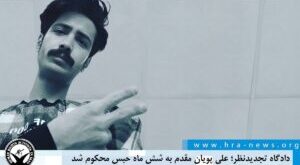Leila Hosseinzadeh was transferred to Adel Abad prison in Shiraz
Aryaei Community News Agency – Leila Hosseinzadeh was transferred to Adel Abad Prison in Shiraz after the interrogation process was completed.
According to Jamia Aryai News Agency, on Tuesday 15th of Shahrivar month 1401, Leila Hosseinzadeh, a student union activist, was transferred to Adel Abad prison in Shiraz after the interrogation. He was transferred to Ward 209 of Evin prison, then in an ambiguous process to detention center No. 100 of Shiraz Intelligence Department and then to the security police of this city.
An informed source in this regard told Human Rights in Iran: “Lila Hosseinzadeh, in a phone call with her family, informed about her transfer to Adel Abad prison and announced that she was transferred to this prison about 7 days ago and due to It is due to non-compliance with the principle of segregation of crimes among prisoners with drug crimes and other non-political crimes. Leila is suffering from an autoimmune disease of the body and is faced with problems such as joint pain, eye discomfort and digestive system failure, and the polluted environment of the prison endangers her health because she is denied access to her medicines.”
Leila Hosseinzadeh was arrested by the security forces on August 29, 1401, and after being transferred to the 209 security ward of the Ministry of Intelligence located in Evin prison, she was then transferred to the detention center No. 100 of the Shiraz Intelligence Department for interrogation, and on September 10, 1401, from The detention center of this security organization was transferred to the Shiraz Security Police detention center known as Soroush.
It should be noted that on January 18, 1400, Leila Hosseinzadeh was summoned to serve her 5-year prison sentence by the 1st branch of the criminal sentence enforcement branch of Evin prison, but it is not clear why the sentence was executed. His imprisonment was suspended.
This student activist, on March 9, 2019, by Branch 28 of Tehran Revolutionary Court headed by Mohammad Reza Amozad, was sentenced to 5 years in prison and 2 years as an additional punishment for the charge of (assembly and collusion with the intention of disrupting the security of the country). Denial of activity in cyber space was condemned. This verdict was confirmed after protesting and referring the case to Branch 36 of the Tehran Court of Appeal.
Leila Hosseinzadeh, for another case, was arrested on December 16, 1400, following a raid by Ministry of Intelligence agents in Shiraz, and was transferred to solitary confinement in Ward 209 of Evin Prison for interrogation, and after being transferred to the women’s ward in Adel Abad Prison, Shiraz. On January 2, 1400, he was released from Adel Abad prison in Shiraz after posting a bond of 1 billion 500 million Tomans.
Simultaneously with the arrest of this student activist, the media close to the security institutions claimed: “Several people were arrested in Shiraz under the title (elements related to foreign anti-revolutionary movements and networks with the leadership of L.H.).”
This student activist, the secretary of the Central Trade Union Council of Tehran University students, on August 6, 2018, was sentenced to 2 years and 6 months in prison for the charge (propaganda activity against the system) which was previously approved by Branch 36 of the Court of Appeal of Tehran Province. After the security agents went to his house, he was arrested and transferred to Evin prison to execute the prison sentence, and on May 30, 1399, he was released conditionally based on the recent directive of the judiciary.
This student activist was sentenced earlier on March 16, 2016 by Branch 26 of Tehran Revolutionary Court headed by Judge Mashaullah Ahmadzadeh to 6 years of imprisonment and 2 years of ban on leaving the country. This ruling was confirmed by Branch 36 of the Court of Appeal of Tehran province after holding two hearings on October 30, 2017 and May 24, 2018.
In Article 5 of the Criminal Procedure Law, it is emphasized on informing the accused as soon as possible about the alleged charges and providing the right of access to a lawyer and other defense rights mentioned in the law.
Suppression of freedom of expression is a violation of Article 19 of the Universal Declaration of Human Rights and Article 19 of the International Covenant on Civil and Political Rights approved on December 16, 1966, which emphasizes the right of individuals to freely disseminate political and ideological ideas and opinions.
Arbitrary detention and the impossibility of access to a lawyer for the accused violates Article 9 of the Universal Declaration of Human Rights and Article 9 of the International Covenant on Civil and Political Rights approved on December 16, 1966.
Also, people’s right to a fair trial is one of the inalienable rights, which is emphasized in Article 10 of the Universal Declaration of Human Rights.
Confessing with threats and intimidation is a violation of international human rights documents. Article 5 of the Universal Declaration of Human Rights and Article 7 of the International Covenant on Civil and Political Rights emphasize the prohibition of torture.



